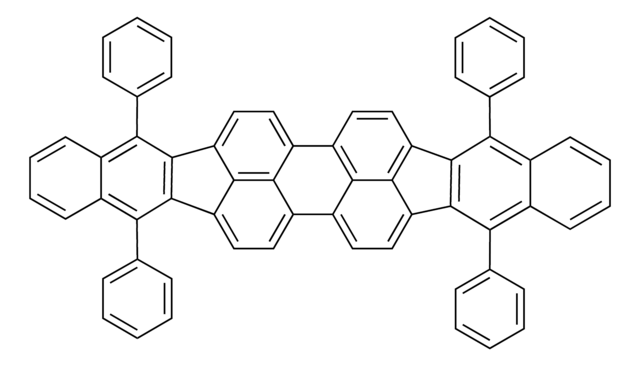551112
Rubrene
sublimed grade, 99.99% trace metals basis
Synonym(s):
5,6,11,12-Tetraphenylnaphthacene
About This Item
Recommended Products
grade
sublimed grade
Assay
99.99% trace metals basis
mp
330-335 °C (lit.)
λmax
299 nm
299 nm
fluorescence
λem 550 nm in THF
Orbital energy
HOMO 5.4 eV
LUMO 3.2 eV
OLED Device Performance
ITO/CuPc/NPD/Alq3:Rubrene (5%): DCM2 (2%)/Alq3/Mg:In
ITO/PEDOT:PSS/EHCz:Rubrene (1 wt%)/Cs2CO3:ITO
SMILES string
c1ccc(cc1)-c2c3ccccc3c(-c4ccccc4)c5c(-c6ccccc6)c7ccccc7c(-c8ccccc8)c25
InChI
1S/C42H28/c1-5-17-29(18-6-1)37-33-25-13-14-26-34(33)39(31-21-9-3-10-22-31)42-40(32-23-11-4-12-24-32)36-28-16-15-27-35(36)38(41(37)42)30-19-7-2-8-20-30/h1-28H
InChI key
YYMBJDOZVAITBP-UHFFFAOYSA-N
Looking for similar products? Visit Product Comparison Guide
General description
Application
Storage Class Code
11 - Combustible Solids
WGK
WGK 3
Flash Point(F)
Not applicable
Flash Point(C)
Not applicable
Personal Protective Equipment
Certificates of Analysis (COA)
Search for Certificates of Analysis (COA) by entering the products Lot/Batch Number. Lot and Batch Numbers can be found on a product’s label following the words ‘Lot’ or ‘Batch’.
Already Own This Product?
Find documentation for the products that you have recently purchased in the Document Library.
Customers Also Viewed
Our team of scientists has experience in all areas of research including Life Science, Material Science, Chemical Synthesis, Chromatography, Analytical and many others.
Contact Technical Service








